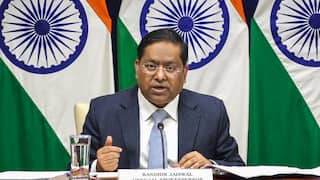US Officials Lobbied Centre To Reverse Laptop Import Rules: Report
The correspondence between officials revealed stark language expressing dismay over India's handling of the situation, reported Reuters.

India has reversed its recently imposed laptop licensing policy, citing a need for further review. This decision follows what US trade officials and government emails obtained by Reuters reveal as behind-the-scenes lobbying by US officials. While this move brings relief to major tech firms like Apple, Dell, and HP, concerns linger regarding India's compliance with WTO obligations and potential future regulations.
The now-reversed policy, introduced in August, mandated that companies such as Apple, Dell, and HP acquire licenses for all imported laptops, tablets, personal computers, and servers. This move sparked fears within the industry of potential sales slowdowns. However, the Centre swiftly retracted the policy within weeks, opting instead to monitor imports and defer any further decisions for a year.
What Did The Emails Reveal?
Email exchanges among US officials, obtained through an open records request, shed light on the significant apprehension the Indian regulations stirred in Washington. The reversal of policy marks a rare lobbying victory for the US, underscoring concerns over India's propensity for sudden policy shifts, which create uncertainty for businesses. Despite India's assertions of promoting a conducive environment for foreign investment, its abrupt policy changes often unsettle stakeholders.
The correspondence between officials revealed stark language expressing dismay over India's handling of the situation. US officials lamented the lack of prior notice or consultation regarding the changes, deeming them "incredibly problematic" for the business climate and the approximately $500 million worth of annual US exports affected.
Counterpoint, a research firm, estimates India's laptop and personal computer market to be valued at $8 billion annually, making it a crucial market for global tech players.
ALSO READ: Govt Relaxes Norms For Shifting Used IT Hardware Assets Like Laptops From SEZs To Domestic Markets
US Trade Representative Katherine Tai engaged with Indian Commerce Minister Piyush Goyal in New Delhi shortly after the policy announcement. While the public readout from the USTR mentioned concerns raised about the policy and emphasised the necessity for stakeholder consultation, private communications revealed a stronger stance. Tai pressed for the complete rescinding of the requirement, citing concerns about the impact on US and other foreign firms operating in India.
In parallel, US diplomat Travis Coberly, stationed in New Delhi, relayed information to his USTR counterparts indicating that Indian officials acknowledged the misstep in the sudden implementation of the laptop licensing policy. Coberly's correspondence highlighted the pressure exerted by American companies in India, which played a role in India's acknowledgement of the blunder.






































